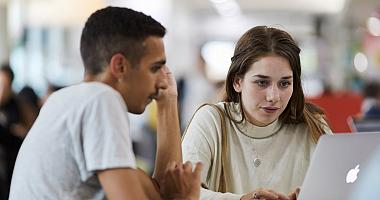BA (Hons) Anthropology, Media and Digital Practice
Content navigation menu
Why study BA Anthropology, Media and Digital Practice at Goldsmiths
In an increasingly media-based world, this programme will equip you with the digital media production skills required to create contemporary anthropologically and socially informed work.
-
Anthropology is the study of humans, culture and society. On this programme, you will develop your theoretical knowledge of anthropology, while honing your digital media production skills to produce creatively challenging work and alternatives to contemporary media representations
-
You will explore creative approaches to digital media, including approaches from contemporary art practice, photojournalism, and many other kinds of media production – as well as more traditional documentary approaches
-
You will receive hands-on training in the use of industry-standard editing software such as Adobe Premiere and Audition. Goldsmiths is an official Adobe Creative Campus, meaning you will also be able to access and download the Adobe Creative Cloud suite for free on your own devices
-
You will be actively encouraged to draw from your own experiences to produce audiovisual work that addresses issues that directly affect your own life, from racial injustices to climate change
-
You will explore ideas of multimodality (the combination of different audiovisual media, such as photography, film, audio recording and others, alongside text to engage with social process) and how this has shifted the discipline of anthropology as a whole
-
On completion of the programme, you will have produced a coherent portfolio of visual and digital creative work, which demonstrates cross-disciplinary skills to potential employers, or for further postgraduate study
Contact
If you have specific questions about the degree, contact Ricardo Leizaola.
UCAS code
L6P3
Entry requirements
A-level: CCC
BTEC: DMM
IB: 27 points overall with three HL subjects at 555
Length
3 years full-time
Fees
Home - full-time: £TBC
International - full-time: £22000
School
Subject
What you'll study
Compulsory modules
In your first year, you will study the following compulsory modules:
| Module title | Credits |
|---|---|
| Introduction to Digital Research Practices | 30 credits |
| Approaches to Contemporary Anthropology | 30 credits |
| Anthropological Methods | 15 credits |
| Ethnographic Film | 15 credits |
| Academic Skills for Anthropology | 15 credits |
| Anthropological Ideas Today | 15 credits |
Note about optional modules (if available): The above is indicative of the typical modules offered, but is not intended to be construed or relied on as a definitive list of what might be available in any given year. The module content and availability is subject to change.
Teaching style
This programme is taught through scheduled learning – for example, through a mixture of lectures, seminars and workshops.
You'll also be expected to undertake a significant amount of independent study. This includes carrying out required and additional reading, preparing topics for discussion, and producing essays or project work.
How you'll be assessed
You’ll be assessed by a variety of methods, depending on your module choices. These may include coursework, examinations, group work and projects.
All assessed work is accompanied by some form of feedback to ensure that your work is on the right track. It may come in a variety of forms ranging from written comments on a marked essay to oral and written feedback on developing projects and practice as you attend workshops.
Entry requirements
We accept the following qualifications:
A-level: CCC
BTEC: DMM
International Baccalaureate: 27 points overall with three HL subjects at 555
Access: Pass with 45 Level 3 credits including 24 Distinctions and a number of merits/passes in subject-specific modules
Scottish qualifications: CCCCD (Higher) or DDD (Advanced Higher)
European Baccalaureate: 65%
Irish Leaving Certificate: H3 H3 H3 H3
Alternative qualifications and experience
See our full list of undergraduate entry qualifications.
We welcome students with a range of educational experiences. If you believe you may not meet the standard qualification requirements we would still encourage you to apply because we consider all aspects of your application when making a decision.
We’ll pay particularly careful attention to your personal statement, which is your opportunity to demonstrate your interest in the subject you’ve applied for. Your referees are also welcome to include any relevant contextual comments around your academic achievements. We’ll look at all these things when making a decision on your application, as well as your qualifications and grades, and may still be able to offer you a place.
International qualifications
We also accept a wide range of international qualifications. Find out more about the qualifications we accept from around the world.
If English isn’t your first language, you will need an IELTS score (or equivalent English language qualification) of 6.0 with a 6.0 in writing and no element lower than 5.5 to study this programme. If you need assistance with your English language, we offer a range of courses that can help prepare you for degree-level study.
Skills and careers
You will be taught a range of digital media skills and pushed to think creatively through the programme, serving you with a strong foundation to continue the development of your own critical media practice.
Importantly, you will develop your ability to critically assess, as well as creatively produce, various forms of digital media content - a vital skill in many contemporary and future workplaces.
Many BA Anthropology, Media and Digital Practice students go on to work as visual practitioners of various kinds; creating and editing digital content in fields such as documentary filmmaking, web-based content creation, visual arts, activism and NGO work.
The theoretical and digital skillsets you will learn will support you in everything from working locally in London with migrant and homeless support services to developing a feature-length documentary with support from the National Lottery, the Sundance Institute and the BFI.
Fees and funding
Annual tuition fees
These are the UG fees for students starting their programme in the 2025/2026 academic year.
- Home - full-time: £TBC
- International - full-time: £22000
If your fees are not listed here, please check our undergraduate fees guidance or contact the Fees Office, who can also advise you about how to pay your fees.
It’s not currently possible for international students to study part-time if you require a Student Visa, however this is currently being reviewed and will be confirmed in the new year. Please read our visa guidance in the interim for more information. If you think you might be eligible to study part-time while being on another visa type, please contact our Admissions Team for more information.
If you are looking to pay your fees please see our guide to making a payment.
Funding opportunities
We offer a wide range of scholarships and bursaries, and our Careers Service can also offer advice on finding work during your studies. Find out more about funding your studies with us.
Additional costs
In addition to your tuition fees, you'll be responsible for any additional costs associated with your course, such as buying stationery and paying for photocopying. You can find out more about what you need to budget for on our study costs page.
There may also be specific additional costs associated with your programme. This can include things like paying for field trips or specialist materials for your assignments. Please check the programme specification for more information.



